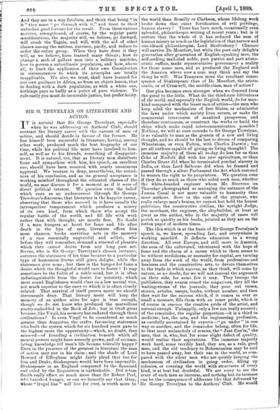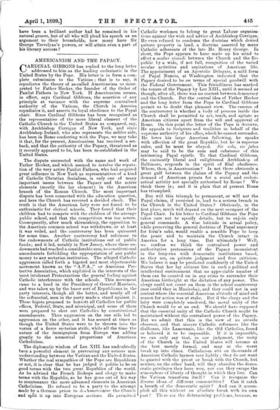SIR G. TREVELYAN ON LITERATURE AND ACTION.
IT is natural that Sir George Trevelyan. especially when he was addressing an Authors' Club, should contrast the literary career with the careers of men of action, and should decide in favour of the former. He has himself been successful in literature, having, among other work, produced much the best biography of our time, while his political life must have involved to him- self, as well as to his friends, something of disappoint- ment. It is natural, too, that as literary men distribute fame and sympathise with him, his speech, an excellent one, should have been received with nearly unanimous approval. We venture to deny. nevertheless, the sound- ness of his conclusion, and as its general acceptance is working mischief throughout the educated classes of the world, we may discuss it for a moment as if it were of direct political interest. We question even the belief which runs as an undercurrent through Sir George Trevelyan's discourse, that literature is the happier career, observing that those who succeed in it have usually the introspective temperament which produces a misery of its own kind, from which those who accept the regular battle of the world, and fill life with work rather than with thought, are mostly free. No doubt if a man hungers at heart for fame and life after death in the lips of men, literature offers him most chances, books surviving acts in the memory of a race essentially ungrateful and selfish, who before they will remember, demand a renewal of pleasure which they cannot derive from any long past act. Sterne, who is Sir George Trevelyan's chosen instance, survives the statesmen of his time because to a particular type of humourist Sterne still gives delight, while the statesmen give none ; but then is the hunger for fame a desire which the thoughtful would care to foster ? It may sometimes be the foible of a noble mind, but it is often indistinguishable from the desire for notoriety, which most sound Englishmen would class as a low mental vice, not much superior to the envy to which it is often closely related. That survival of itself proves merit we should strenuously deny. That literary merit will keep the memory of an author alive for ages is true enough, though we do not know who produced the marvellous poetry embedded in the Book of Job ; but is Ovid great because, like Virgil, his memory has endured through three civilisations ? Is even Virgil to be considered so much greater than Augustus, the crafty, far-seeing statesman who built the system which for six hundred years gave to the highest races the opportunity—which, no doubt, they misused—of founding a civilisation beneath which all mental powers might have serenely grown, and of accumu- lating knowledge till man's life became tolerably happy ? Even in the presence of the greatest in literature the man of action may put in his claim ; and the shade of Lord Howard of Effingham might fairly plead that but for him and Drake, Shakespeare would have been impossible. Shakespeare in an England conquered by the Spaniard and ruled by the Inquisition is unthinkable. Did Adam Smith really effect so much more than Sir Robert Peel, who banished hunger, or can we honestly say that Gray, whose "frugal line" will live for ever, is worth more to the world than Romilly or Clarkson, whose lifelong work broke down that outer fortification of evil privilege, human slavery ? There has been much, occasionally even splendid, philanthropic writing of recent years ; but is it certain that the whole of it has reduced the sum of human misery as much as the legislation of that narrow and one-ideaed philanthropist, Lord Shaftesbury ? Chaucer will survive De Montfort, but while the poet only delights generation after generation of English-speaking men, the self-seeking mail-clad noble, part patriot and part aristo- cratic ruffian, made representative government a reality for those same men, and so produced the England and the America where now a man may think and say the thing he will. Was Tennyson more the resultant conse- quence of Shakespeare than of De Montfort, the aristo- cratic, or of Cromwell, the middle-class, man of action?
Our plea becomes even stronger when we descend from the great to the little. What do the third-rate litterateurs of the world, and especially the English world, do for man- kind compared with the lesser men of action—the men who keep oiled the mechanism of free States, or administer the laws under which society lives secure, or make the commercial intercourse of mankind prosperous, and therefore continuous, or construct the works or build the ships which make rapid intercommunication possible ? Nothing, we will at once concede to Sir George Trevelya.n, is so valuable to man as the genesis of a new and living thought, and we should be the last to dream of comparing Wheatstone, or even Fulton, with Charles Darwin ; but are all authors capable of giving us living thought? The immense majority of them all to-day do less for us than Coke of Norfolk did with his new agriculture, or than Charles Grant did when he terminated prmdial slavery in India, or than Lord Selborne did when. he framed and passed through a silent Parliament the Act which restored to women the right to be proprietors. We question even if they do as much as thc;se who aided such men, whether the white-bearded engineer whom Mr. Steevens on Thursday photographed as managing the entrance of the Jumna Canal is not more valuable to humanity than most authors. Save in the case of the greatest, who really enlarge men's brains, we cannot but hold the honest politician, the constructive civilian, the upright Judge, the merchant, the engineer, the shipbuilder, at least as great as the author, who in the majority of cases will perish as quickly as his books, printed as they are on the rotten paper of modern times.
The idea which is at the basis of Sir George Trevelyan's speech is, we know, spreading fast, and everywhere is working mischief. It deflects education in a wrong direction. All over Europe, and still more in America, the sons of the cultivated, intoxicated with the hope of fame and the charm of a career which to them seems to be without sordidness, or necessity for capital, are turning away from the work of the world, from professions and business and the constructive arts, to devote themselves to the trade in which success, as they think, will come by nature, as no doubt, for we will not conceal the argument on their side, for some few it may. They besiege the publishers, they swarm round the magazines, they fill the waiting-rooms of the journals, they pour out verses, stories, articles, essays, books, without number, and then they wait for the success which, if it comes in ever so small a measure, fills them with an inner pride, which is of course in essence the creative pride of the artist, and natural enough. Unhappily, only a few can really succeed ; of the remainder, the regular proportion—it is a third in medicine, law, the arts, and the engineering profession, as carefully ascertained by experts—" go under" in one way or another, and the remainder belong, often for life, to that most melancholy of armies, the " Just Can'ts," the men, that is, who, but for some slight defect of quality, would realise their aspirations. The immense majority work hard, some terribly hard, they are, as a rule, good men, and the old tendency to Bohemianism may be said to have passed away, but their use in the world, as com- pared with the silent men who are quietly keeping the mechanism of civilisation in going order, filling up colonies, or covering the world with structures of every kind, is at best but doubtful. We are sorry to see the army of such men so increase, and nothing but its increase can be the consequence of addresses like that delivered by Sir George Trevelyan to the Authors' Club. He would
have been a brilliant author had he remained in his natural groove, but of all who will plead his speech as an argument to their households, how many have Sir George Trevelyan's powers, or will attain even a part of his literary success ?







































 Previous page
Previous page